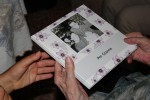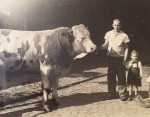A little balm for the soul is in order, I think, and a mother meeting her daughter for the first time 70 years after she was taken from her just after birth during World War II definitely qualifies.
 While still a teenager, Gianna (she prefers to remain anonymous) left her hometown of Novellara in northern Italy’s Emilia Romagna province to work in Germany. Italy and Germany were still allies then, and many Italian women were recruited as labourers. She worked in a factory in Eberbach where she met and fell in love with a young Nazi soldier. After Italy signed an armistice with the Allies in September of 1943, the Italian labourers found themselves stuck in Germany under significantly less cordial circumstances. They were converted to forced-labour status and moved into camps. Gianna got pregnant and gave birth in October 1944 only to have her parental custody revoked a month later and her infant daughter taken from her by the Nazi Welfare and Juvenile Office.
While still a teenager, Gianna (she prefers to remain anonymous) left her hometown of Novellara in northern Italy’s Emilia Romagna province to work in Germany. Italy and Germany were still allies then, and many Italian women were recruited as labourers. She worked in a factory in Eberbach where she met and fell in love with a young Nazi soldier. After Italy signed an armistice with the Allies in September of 1943, the Italian labourers found themselves stuck in Germany under significantly less cordial circumstances. They were converted to forced-labour status and moved into camps. Gianna got pregnant and gave birth in October 1944 only to have her parental custody revoked a month later and her infant daughter taken from her by the Nazi Welfare and Juvenile Office.
 When the war ended, Gianna returned home, certain her daugher and the baby’s father were dead. In fact, the baby girl had spent a short time in a children’s home before her father, still very much alive, “adopted” her. Unbeknownst to Gianna, the soldier had been married all along. He brought his daughter home and he and his wife raised her and the seven half-siblings born after the war. Margot Bachmann, as the baby girl was named, was told only that her mother was Italian and dead. Her strict father forbade her to ask any questions about her parentage.
When the war ended, Gianna returned home, certain her daugher and the baby’s father were dead. In fact, the baby girl had spent a short time in a children’s home before her father, still very much alive, “adopted” her. Unbeknownst to Gianna, the soldier had been married all along. He brought his daughter home and he and his wife raised her and the seven half-siblings born after the war. Margot Bachmann, as the baby girl was named, was told only that her mother was Italian and dead. Her strict father forbade her to ask any questions about her parentage.
She had an inkling even as a youngster that there was something off about this story, but her father was so adamant that she not look into it that even as an adult she was intimidated. It was only after his death two years ago and with the encouragement of her daughter that she began to break free of the psychological chains and seriously contemplate searching for the truth about her mother, never expecting to find her still alive. With the wreckage of war to sift through, Margot hit a few walls before finally finding her certificate of baptism that recorded her mother’s name.
 Armed with the precious name, Margot contacted the German Red Cross who put her in touch with International Tracing Service (ITS) in Bad Arolsen, Germany, an organization dedicated to reuniting families torn apart by war. ITS has a vast archive of 30 million documents — original papers, thousands of envelopes with personal effects like wallets, correspondence files and much more — pertaining to victims of Nazi camps, 90% of which have been digitized. After an extensive search, ITS was able to find Gianna’s name and information this July. Working with the Italian Red Cross’ Family Links Networks, they were then able to locate Margot’s mother, alive and in good health at 91 years old and still living in her hometown. Had she moved at any point in the past seven decades, they would probably never have found her.
Armed with the precious name, Margot contacted the German Red Cross who put her in touch with International Tracing Service (ITS) in Bad Arolsen, Germany, an organization dedicated to reuniting families torn apart by war. ITS has a vast archive of 30 million documents — original papers, thousands of envelopes with personal effects like wallets, correspondence files and much more — pertaining to victims of Nazi camps, 90% of which have been digitized. After an extensive search, ITS was able to find Gianna’s name and information this July. Working with the Italian Red Cross’ Family Links Networks, they were then able to locate Margot’s mother, alive and in good health at 91 years old and still living in her hometown. Had she moved at any point in the past seven decades, they would probably never have found her.
Margot wrote her mother a letter:
“Dear Mum, my name is Margot Bachmann and I am your daughter, born on Oct 25 1944 in Heidelberg. All my life I asked my family about you, without being given any answers. I want to come and find you so that I can hug you once again. I’m immensely happy to be able to finally know you.”
 The weekend before last, that dream came true and mother and daugher embraced for the first time.
The weekend before last, that dream came true and mother and daugher embraced for the first time.
Laura Bastianetto of the Italian Red Cross, who was there to witness the event, said Bachmann was moved to see her mother last weekend after so many years.
“The embrace took place in a small and modest house in Novellara — a little town in the north of Italy,” she said. “It was really emotional. There were Italian and German families together with a bottle of sparkling wine for celebrating this magic moment. Margot brought an album with pictures of her family. She was very touched by the meeting and she cried.”
During the encounter, according to Bastianetto, the mother said, “I’ve paid a lot, now I want to laugh.”
The fact that Gianna has asked not to be named or photographed is an ancillary cost of that high price she’s had to pay. Women who fraternized with Germans in occupied countries were not treated well after the war was over. There are stories from France, Norway, Italy, all over, of women being forced to parade through town with their heads shaved, spat upon and derided by crowds. They were ostracized for years, and it’s not so far in the past either. Norway just allowed its handful of surviving “German whores” to receive a state pension in 2005.
“I can understand [Gianna’s] position,” said Elena Carletti, the mayor of Novellara. “In this village, people have not forgotten [the war]. Even my generation knows the names of those who, during the war, were for or against the Germans. These stories still weigh heavily on many families. This encounter between a mother and daughter reminds us of a complicated chapter of history.”
Margot is planning to visit her mother again as soon as possible.